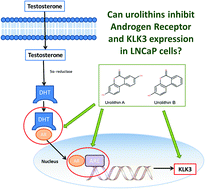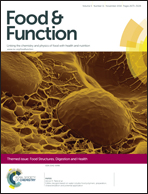Walnut polyphenol metabolites, urolithins A and B, inhibit the expression of the prostate-specific antigen and the androgen receptor in prostate cancer cells
Abstract
Walnuts have been gathering attention for their health-promoting properties. They are rich in polyphenols, mainly ellagitannins (ETs) that after consumption are hydrolyzed to release ellagic acid (EA). EA is further metabolized by microbiota to form urolithins, such as A and B, which are absorbed. ETs, EA and urolithins have shown to slow the proliferation and growth of different types of cancer cells but the mechanisms remain unclear. We investigate the role of urolithins in the regulatory mechanisms in prostate cancer, specifically those related to the androgen receptor (AR), which have been linked to the development of this type of cancer. In our study, urolithins down-regulated the mRNA and protein levels of both prostate specific antigen (PSA) and AR in LNCaP cells. The luciferase assay performed with a construct containing three androgen response elements (AREs) showed that urolithins inhibit AR-mediated PSA expression at the transcriptional level. Electrophoretic mobility shift assays revealed that urolithins decreased AR binding to its consensus response element. Additionally, urolithins induced apoptosis in LNCaP cells, and this effect correlated with a decrease in Bcl-2 protein levels. In summary, urolithins attenuate the function of the AR by repressing its expression, causing a down-regulation of PSA levels and inducing apoptosis. Our results suggest that a diet rich in ET-containing foods, such as walnuts, could contribute to the prevention of prostate cancer.


 Please wait while we load your content...
Please wait while we load your content...